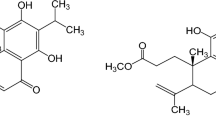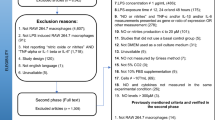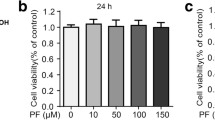Abstract
Objective
The aim of the present study was to investigate the effects of folic acid on the inflammatory responses to lipopolysaccharide (LPS) in RAW264.7 cells and the signal transduction pathways involved.
Methods
RAW264.7 macrophages were used. The production of nitric oxide (NO) was determined by the Griess test. The protein levels and mRNA expression of tumor necrosis factor-alpha (TNF-α) and interleukin-1 beta (IL-1β) were determined by ELISA and RT-PCR, respectively. The phosphorylation of mitogen-activated protein kinases (MAPKs) and nuclear nuclear factor-kappa B (NF-κB) p65 protein were analyzed by Western blotting.
Results
Folic acid inhibited LPS-induced production of NO, TNF-α and IL-1β with decreased mRNAs of inducible nitric oxide synthase (iNOS), TNF-α and IL-1β. Further study showed that folic acid inhibited the LPS-induced phosphorylation of MAPKs and the nuclear translocation of NF-κB.
Conclusion
Folic acid inhibits the inflammatory response of RAW 264.7 cells to LPS through inhibiting the MAPKs and NF-κB pathways.




Similar content being viewed by others
References
Iyer R, Tomar SK. Folate: a functional food constituent. J Food Sci. 2009;74:R114–22.
Hoffbrand AV, Weir DG. The history of folic acid. Br J Haematol. 2001;113:579–89.
Scott JM, Weir DG. Folic acid, homocysteine and one-carbon metabolism: a review of the essential biochemistry. J Cardiovasc Risk. 1998;5:223–7.
Wani NA, Hamid A, Kaur J. Folate status in various pathophysiological conditions. IUBMB Life. 2008;60:834–42.
Gori T, Burstein JM, Ahmed S, Miner SE, Al-Hesayen A, Kelly S, et al. Folic acid prevents nitroglycerin-induced nitric oxide synthase dysfunction and nitrate tolerance: a human in vivo study. Circulation. 2001;104:1119–23.
Wang X, Qin X, Demirtas H, Li J, Mao G, Huo Y, et al. Efficacy of folic acid supplementation in stroke prevention: a meta-analysis. Lancet. 2007;369:1876–82.
Magni E, Bianchetti A, Rozzini R, Trabucchi M. Influence of nutritional intake on 6-year mortality in an Italian elderly population. J Nutr Elder. 1994;13:25–34.
Imamura A, Murakami R, Takahashi R, Cheng XW, Numaguchi Y, Murohara T, et al. Low folate levels may be an atherogenic factor regardless of homocysteine levels in young healthy nonsmokers. Metabolism. 2010;59:728–33.
Lonn E, Yusuf S, Arnold MJ, Sheridan P, Pogue J, Micks M, et al. Homocysteine lowering with folic acid and B vitamins in vascular disease. N Engl J Med. 2006;354:1567–77.
McCarty MF, Barroso-Aranda J, Contreras F. High-dose folate and dietary purines promote scavenging of peroxynitrite-derived radicals–clinical potential in inflammatory disorders. Med Hypotheses. 2009;73:824–34.
Title LM, Ur E, Giddens K, McQueen MJ, Nassar BA. Folic acid improves endothelial dysfunction in type 2 diabetes––an effect independent of homocysteine-lowering. Vasc Med. 2006;11:101–9.
Solini A, Santini E, Ferrannini E. Effect of short-term folic acid supplementation on insulin sensitivity and inflammatory markers in overweight subjects. Int J Obes (Lond). 2006;30:1197–202.
Chiarello PG, Penaforte FR, Japur CC, Souza CD, Vannucchi H, Troncon LE. Increased folate intake with no changes in serum homocysteine and decreased levels of C-reactive protein in patients with inflammatory bowel diseases. Dig Dis Sci. 2009;54:627–33.
Zhang R, Ma J, Xia M, Zhu H, Ling W. Mild hyperhomocysteinemia induced by feeding rats diets rich in methionine or deficient in folate promotes early atherosclerotic inflammatory processes. J Nutr. 2004;134:825–30.
Libby P. Inflammation in atherosclerosis. Nature. 2002;420:868–74.
Laskin DL, Pendino KJ. Macrophages and inflammatory mediators in tissue injury. Annu Rev Pharmacol Toxicol. 1995;35:655–77.
Mosmann T. Rapid colorimetric assay for cellular growth and survival: application to proliferation and cytotoxicity assays. J Immunol Methods. 1983;65:55–63.
Green LC, Wagner DA, Glogowski J, Skipper PL, Wishnok JS, Tannenbaum SR. Analysis of nitrate, nitrite, and [15N]nitrate in biological fluids. Anal Biochem. 1982;126:131–8.
Carter AB, Knudtson KL, Monick MM, Hunninghake GW. The p38 mitogen-activated protein kinase is required for NF-kappaB-dependent gene expression. The role of TATA-binding protein (TBP). J Biol Chem. 1999;274:30858–63.
Nakano H, Shindo M, Sakon S, Nishinaka S, Mihara M, Yagita H, et al. Differential regulation of IkappaB kinase alpha and beta by two upstream kinases, NF-kappaB-inducing kinase and mitogen-activated protein kinase/ERK kinase kinase-1. Proc Natl Acad Sci USA. 1998;95:3537–42.
Yea SS, Yang KH, Kaminski NE. Role of nuclear factor of activated T-cells and activator protein-1 in the inhibition of interleukin-2 gene transcription by cannabinol in EL4 T-cells. J Pharmacol Exp Ther. 2000;292:597–605.
Korhonen R, Lahti A, Kankaanranta H, Moilanen E. Nitric oxide production and signaling in inflammation. Curr Drug Targets Inflamm Allergy. 2005;4:471–9.
Detmers PA, Hernandez M, Mudgett J, Hassing H, Burton C, Mundt S, et al. Deficiency in inducible nitric oxide synthase results in reduced atherosclerosis in apolipoprotein E-deficient mice. J Immunol. 2000;165:3430–5.
Beutler B. TNF, immunity and inflammatory disease: lessons of the past decade. J Investig Med. 1995;43:227–35.
Gabay C, Lamacchia C, Palmer G. IL-1 pathways in inflammation and human diseases. Nat Rev Rheumatol. 2010;6:232–41.
Bluthgen N, Legewie S. Systems analysis of MAPK signal transduction. Essays Biochem. 2008;45:95–107.
Turjanski AG, Vaque JP, Gutkind JS. MAP kinases and the control of nuclear events. Oncogene. 2007;26:3240–53.
Ghosh S. Regulation of inducible gene expression by the transcription factor NF-kappaB. Immunol Res. 1999;19:183–9.
Hayden MS, Ghosh S. Signaling to NF-kappaB. Genes Dev. 2004;18:2195–224.
Acknowledgments
This work was supported by the National Natural Science Foundation of China (Grant No. 30872101).
Author information
Authors and Affiliations
Corresponding author
Additional information
Responsible Editor: Liwu Li.
D. Feng and Y. Zhou are contributed equally to this work.
Rights and permissions
About this article
Cite this article
Feng, D., Zhou, Y., Xia, M. et al. Folic acid inhibits lipopolysaccharide-induced inflammatory response in RAW264.7 macrophages by suppressing MAPKs and NF-κB activation. Inflamm. Res. 60, 817–822 (2011). https://doi.org/10.1007/s00011-011-0337-2
Received:
Revised:
Accepted:
Published:
Issue Date:
DOI: https://doi.org/10.1007/s00011-011-0337-2




